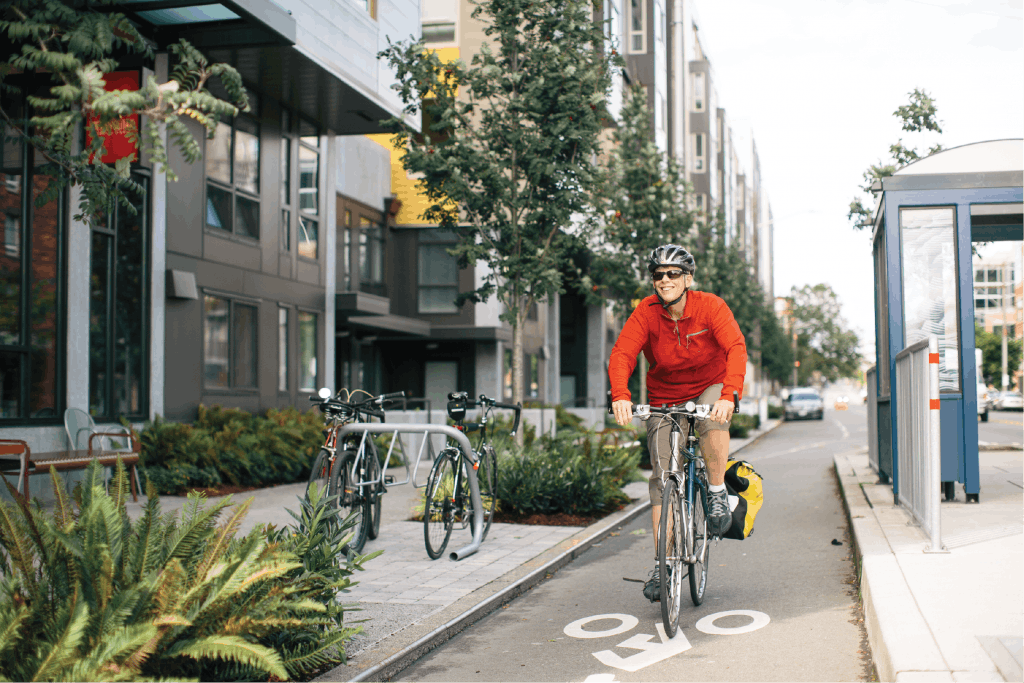Explore Our Network of Sites
Search
By:

Due to the constantly changing dimensions of the COVID-19 crisis, we encourage you to follow all current CDC guidelines as well as local travel advisories and recommendations. Take care of yourselves and loved ones. We’re all in this together.
A bike network includes all bike lanes, paths and trails that allow people on bikes to move around a city. The Network score evaluates the quality of a city’s bike network and how completely it links people to each other and local destinations using comfortable routes. A high-scoring network is one that connects people with where they want to go, safely and efficiently. Perceptions of the network are also given weight.
A more complete bike network increases safety as well as ridership, and when more people go by bike, transportation becomes better for all road users. Network quality is based on two factors:
What makes a small Colorado ski town tucked in the heart of the Rocky Mountains so good for bikes? “In Crested Butte, it’s all about singletrack,” says Dave Ochs, director of the Crested Butte Mountain Bike Association (CBMBA). CBMBA has been advocating for, building and maintaining trails to make the network and access to it the best it can be since 1983.”
With a “downtown” that’s only nine square blocks, it’s no surprise that the main form of transportation for most in-town Crested Butte residents (even in winter months) is on two wheels. But don’t let its size fool you — Crested Butte is the hub for over 450 miles of trails, all cared for by the Crested Butte Conservation Corps, a full-time trail care and stewardship crew started by the CBMBA.
What’s the best way for a town to develop a thriving bike network? Ochs says it’s teamwork. “Work closely with the community, the stakeholders, the agencies and the local government. When it comes to recreation, people usually have more in common than not, and bringing everyone to the table usually yields quality returns and sustainable compromises.”
While a lot of cities have a history of biking, few have one as old as Provincetown, which saw the first proposal for a bike path in town way back in 1899. 68 years later, the Province Lands Bike Trail in the Cape Cod National Seashore was the first bike trail built in a national park.
“Since people have been riding bikes here long before automobiles, it’s much more common than other places in the U.S.,” says Chair of the Provincetown Bicycle Committee, Rik Ahlberg. “Much of Provincetown was laid out for people on foot and carriages.”
Today, those streets (that are as skinny as 9 feet wide) have speed limits posted as low as 5 MPH, allowing many of Provincetown’s residents and tourists to go by bike without the worry of a car speeding past. As for the city’s newer, faster roadways, the Public Works department has prioritized adding bike lanes where possible when resurfacing streets, and will complete a new climbing lane for bikes this summer.
While the small town on the tip of Cape Cod may only have less than 3,000 year-round residents, a busy summer day can bring in over 50,000 visitors, with daily bike rentals being the go-to way many Provincetown tourists choose to travel and see the town.
“The best part about Provincetown is that so many people ride bikes,” says Ahlberg. “Bikes are used everyday for transportation to and from work, for grocery trips, just to get around town and of course for trips to the beach. It reminds me of my childhood in the 1970s when everyone was riding bicycles. The difference here is that it’s not just a fad.”